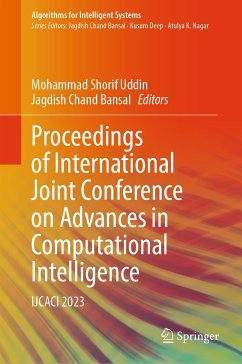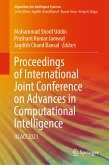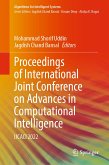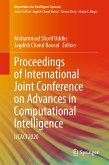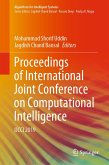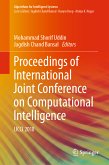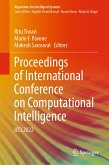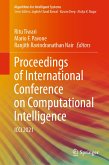Proceedings of International Joint Conference on Advances in Computational Intelligence (eBook, PDF)
IJCACI 2023
Redaktion: Uddin, Mohammad Shorif; Bansal, Jagdish Chand


Alle Infos zum eBook verschenken

Proceedings of International Joint Conference on Advances in Computational Intelligence (eBook, PDF)
IJCACI 2023
Redaktion: Uddin, Mohammad Shorif; Bansal, Jagdish Chand
- Format: PDF
- Merkliste
- Auf die Merkliste
- Bewerten Bewerten
- Teilen
- Produkt teilen
- Produkterinnerung
- Produkterinnerung

Hier können Sie sich einloggen

Bitte loggen Sie sich zunächst in Ihr Kundenkonto ein oder registrieren Sie sich bei bücher.de, um das eBook-Abo tolino select nutzen zu können.
This book gathers outstanding research papers presented at the 7th International Joint Conference on Advances in Computational Intelligence (IJCACI 2023), held in hybrid mode at South Asian University, New Delhi, India during October 14-15, 2023. IJCACI 2023 is jointly organized by Jahangirnagar University (JU), Bangladesh and South Asian University (SAU), India. The book presents the novel contributions in areas of computational intelligence and it serves as a reference material for advance research. The topics covered are collective intelligence, soft computing, optimization, cloud…mehr
- Geräte: PC
- ohne Kopierschutz
- eBook Hilfe
- Größe: 22.55MB
![Proceedings of International Joint Conference on Advances in Computational Intelligence (eBook, PDF) Proceedings of International Joint Conference on Advances in Computational Intelligence (eBook, PDF)]() Proceedings of International Joint Conference on Advances in Computational Intelligence (eBook, PDF)217,95 €
Proceedings of International Joint Conference on Advances in Computational Intelligence (eBook, PDF)217,95 €![Proceedings of International Joint Conference on Advances in Computational Intelligence (eBook, PDF) Proceedings of International Joint Conference on Advances in Computational Intelligence (eBook, PDF)]() Proceedings of International Joint Conference on Advances in Computational Intelligence (eBook, PDF)242,95 €
Proceedings of International Joint Conference on Advances in Computational Intelligence (eBook, PDF)242,95 €![Proceedings of International Joint Conference on Advances in Computational Intelligence (eBook, PDF) Proceedings of International Joint Conference on Advances in Computational Intelligence (eBook, PDF)]() Proceedings of International Joint Conference on Advances in Computational Intelligence (eBook, PDF)161,95 €
Proceedings of International Joint Conference on Advances in Computational Intelligence (eBook, PDF)161,95 €![Proceedings of International Joint Conference on Computational Intelligence (eBook, PDF) Proceedings of International Joint Conference on Computational Intelligence (eBook, PDF)]() Proceedings of International Joint Conference on Computational Intelligence (eBook, PDF)161,95 €
Proceedings of International Joint Conference on Computational Intelligence (eBook, PDF)161,95 €![Proceedings of International Joint Conference on Computational Intelligence (eBook, PDF) Proceedings of International Joint Conference on Computational Intelligence (eBook, PDF)]() Proceedings of International Joint Conference on Computational Intelligence (eBook, PDF)161,95 €
Proceedings of International Joint Conference on Computational Intelligence (eBook, PDF)161,95 €![Proceedings of International Conference on Computational Intelligence (eBook, PDF) Proceedings of International Conference on Computational Intelligence (eBook, PDF)]() Proceedings of International Conference on Computational Intelligence (eBook, PDF)226,95 €
Proceedings of International Conference on Computational Intelligence (eBook, PDF)226,95 €![Proceedings of International Conference on Computational Intelligence (eBook, PDF) Proceedings of International Conference on Computational Intelligence (eBook, PDF)]() Proceedings of International Conference on Computational Intelligence (eBook, PDF)113,95 €
Proceedings of International Conference on Computational Intelligence (eBook, PDF)113,95 €-
-
-
Dieser Download kann aus rechtlichen Gründen nur mit Rechnungsadresse in A, B, BG, CY, CZ, D, DK, EW, E, FIN, F, GR, HR, H, IRL, I, LT, L, LR, M, NL, PL, P, R, S, SLO, SK ausgeliefert werden.
- Produktdetails
- Verlag: Springer Nature Singapore
- Seitenzahl: 813
- Erscheinungstermin: 1. April 2024
- Englisch
- ISBN-13: 9789819701803
- Artikelnr.: 70275935
- Verlag: Springer Nature Singapore
- Seitenzahl: 813
- Erscheinungstermin: 1. April 2024
- Englisch
- ISBN-13: 9789819701803
- Artikelnr.: 70275935
- Herstellerkennzeichnung Die Herstellerinformationen sind derzeit nicht verfügbar.
